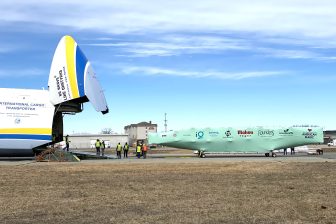
DAKOSY: ICS phase 2 kicks off in March 2023, get prepared
DAKOSY, a digital solutions provider for international freight forwarding has urged companies to act well in advance of the implementation of the second phase of the European security system ICS. The European security system ICS for risk assessment/crisis prevention will become concrete for air freight shipments from third countries entering the EU starting in March 2023.
As a result of the 9/11 terrorist attacks, the ICS procedure was introduced for the declaration of goods prior to entry into the EU for risk assessment/crisis prevention. With ICS2, the EU is centralising declarations by carriers with a cargo advance information system: as of March 2023 for airlines and as of March 2024 for shipping companies.
“The next-stage procedure ICS2 will bring improvements for the participants, especially with regard to competition protection,” emphasises Simon Lembke, director of Customs and Forwarding Applications at DAKOSY. Hamburg software provider DAKOSY is prepared with new processes and interfaces.
DAKOSY recommends that participants in the ICS process prepare for the changeover in good time. It must be ensured that sufficiently precise data can be provided. A standardised format called the Entry Summary Declaration (ENS) has been defined for ICS2, which does not permit any deviations. The required accuracy of the data is also becoming stricter, for example in the case of the HS code. Previously, either the goods description or at least four digits of the HS code had to be provided for the entry summary declaration; in the future, all six digits of the HS code must be transmitted.
“For our customers, which include many major airlines and shipping companies, we already work with this format. So for them, by and large, everything remains as it is, and we take care of the new reporting path and, if necessary, an adaptation of the interfaces. However, we recommend checking well in advance to find out the extent to which business processes need to be updated and employees need to be trained,” says Lembke.
Lembke summarises the most significant changes, “In the future, declarations will be sent directly to the new EU system, the Shared Trader Interface (STI), and must be provided before the goods are loaded. In comparison, previously the entry declaration had to be submitted electronically no later than four hours before arrival at the customs authority where the goods first reached the borders of the EU.
Less data for logistics providers
Another important change, he adds, is the possibility that shipping companies or airlines would only have to submit basic information to the EU cargo advance information system, and the additional information would be reported directly to the ICS system by freight forwarders or logistics providers, for example. This principle, called “multiple filing,” provides competitive protection for the operators. “Freight forwarders and logistics providers no longer need to disclose the names of their customers and their related critical data to the shipping companies or airlines in the course of the procedure,” Lembke explains.
You just read one of our premium articles free of charge
Register now to keep reading premium articles.



